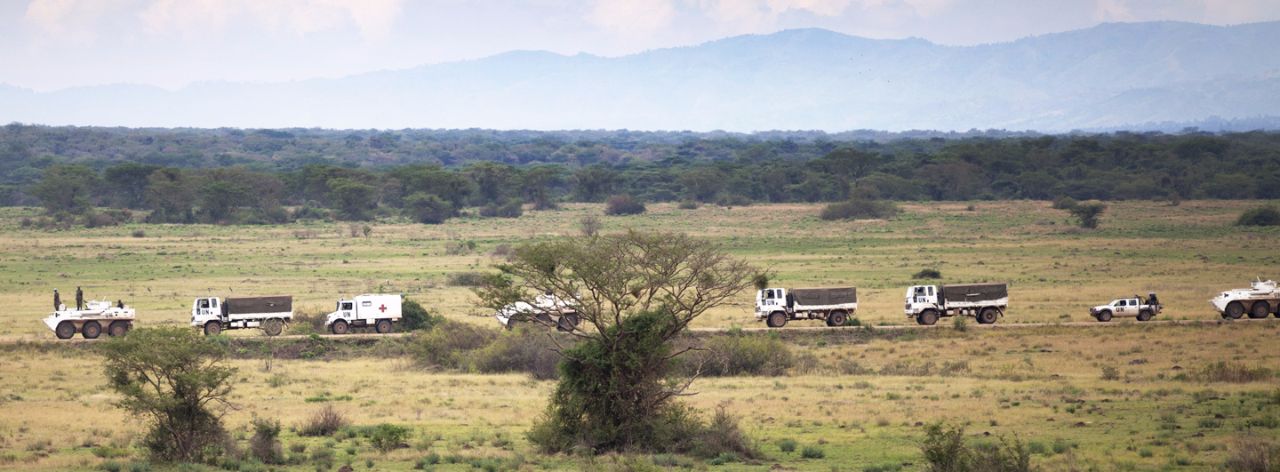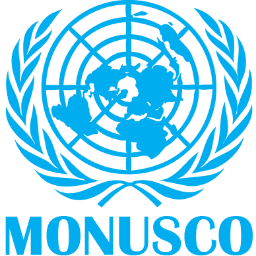The former Force Commander of MONUSCO, LtGen Carlos Alberto dos Santos Cruz, talked to Shabka about his past experiences, the increased complexity of conflict today and the effort of the UN in tackling the related challenges ahead.

Shabka: Until April 2009 you held command of the United Nations Stabilization Mission in Haiti (MINUSTAH). In April 2013, you received command of a UN Force for the second time in your career. You then commanded the United Nations Organization Stabilization Mission in the Democratic Republic of the Congo (MONUSCO), the biggest UN peacekeeping force in the world, until the end of December 2015. In hindsight, what would you consider the main differences as the Force Commander of MONUSCO compared to MINUSTAH a few years before?
LTG Santos Cruz: There are many differences between MINUSTAH and MONUSCO.
One important lesson that I’ve learned was that the size of the country alone is one important factor. The Democratic Republic of the Congo (DRC) is almost 100 times bigger than Haiti. Only the eastern part of the DRC, where the main problems of violence are concentrated, is many times bigger than the whole of Haiti. It brings many difficulties to move troops and to communicate with the different locations where the mission is deployed.
In the DRC the level of violence against civilians was very dramatic. In Haiti this was not the case. This touches on the factor of the dimension of the mission and the means available to the military force: At the time I was commanding MINUSTAH there were about 7.500 uniformed personnel while in the DRC there were a bit more than 20.000 military personnel. Also, it meant that the means available for the military force to take action must be much more significant in the DRC than in Haiti, which they are in fact, even though it was appropriate for MINUSTAH as well.
This all adds to the complexity of the mission, especially given the already mentioned size of the country.

Shabka: Touching on the discrepancy between the diplomatic “ivory tower” and challenges on the ground, what would you consider essential to successfully translate necessities stemming from realities in the field into making mandates more flexible – or asked in more general terms: does such a necessity exist?
LTG Santos Cruz: The UN Security Council (UNSC) mandates are documents in a political and diplomatic language. It is normal to be this way. People on the ground are responsible to translate the UNSC mandates into action. It then depends on the motivation and will of the people in the field. Since the mandates are usually not too complicated or difficult, understanding the diplomatic language generally should not be a big issue. But you are right; there are a few aspects that could cause divergence between the legal frame of the respective mandate and the practical necessities.
Typically, people on the ground should be compelled to have a rather positive approach in interpreting mandates in order to be able to take effective action. Interpreting a mandate in a negative way would mean seeing the document as a restriction. In reality, it is a question of attitude, leadership, will and motivation of individuals.
In reality, it is a question of attitude, leadership, will and motivation of individuals.
Responsiveness is another crucial aspect. Apart from many other factors, it obviously depends on the means available. But it is with the resources a mission has at hand, it should do as much as possible and reach a maximal outcome. Only after these assets are exhausted more means should be requested.
Proportionality is one other element to consider which largely depends on the situation. In the mission routine, small incidents in the force should be met with suitable proportionality. But mission routine is not the crucial question here. It is in combat where the challenges lie. There, the force should be overwhelming. The force should win the battles quickly. It is exactly here where there is the biggest challenge lies to work within the given mandates to win confrontations with minimum losses on all sides. This is not an easy task.
Shabka: Indeed. Being action-oriented is crucial in this respect. In your view, what would be practical steps to more action-oriented peace operations in regard to a changing nature of conflict? Specifically, what would you identify as being needed to prioritize prevention and mediation in order to break the cycle of responding too late and too expansively from your experience?
LTG Santos Cruz: There are many considerations, discussions, and academic work being done on the topics of prevention and mediation. Obviously, more prevention and mediation is desirable. Reaching more solutions through prevention and mediation is what everybody wants. It would be the ideal situation. That it is important is out of the question.
The big question is how to achieve such solutions and to implement prevention and mediation in practice. On the theoretical level this is much easier than done in practice. Unfortunately, in many cases it is not possible to implement peaceful solutions and it is the military component of a UN force then needs to be used to protect civilians. In order to be effective militarily, the UN should take some measures to have better information, more in-depth intelligence, and troops able to operate with a high level of dynamics and quality. Quality is generated basically by motivation. Therefore, this is really the main aspect to be developed.
Quality is generated basically by motivation. Therefore, this is really the main aspect to be developed.
Shabka: Looking into the mandates for MINUSMA or MINUSCA, one can clearly see an extension of responsibilities and tasks compared to previous UN mandates. In a way, this can be interpreted as a reflection of the increased complexity of conflict today. Against this background, what role do you accredit to capacity building of personnel for peace operations in the future? If increased intricacy of working in the field requires enhanced capabilities of peacekeeping forces, what could be training requirements for future deployments?
LTG Santos Cruz: Undoubtedly, there was an evolution in the complexity of conflicts where UN is being deployed. Over time the complexity definitely increased. However, UN missions didn’t adapt to these changes in the same pace.
This is understandable though. The UN is a huge structure and modifications are very hard to take place because of the political environment, the diversity of interests, and the political interpretations within the organization. As a result, the situations on the ground changed and UN missions didn’t change appropriately. But now it seems that the UN is trying very hard “to get the bus moving” in order to catch up with these developments.
When we consider the UN’s dimension and complexity, it is only logical that is not an easy task to respond to these developments, however. There are many elements that have to be considered. Therefore, I will limit my answer to your questions on the training of the military. Some comments and a few examples on this subject:

It would be desirable to enhance night combat capabilities in order to be able to push the confrontations to night operations because UN troops are technologically more advanced than their opponents. Also, I’d advise tactical assets to protect civilians and own personnel in order to reduce casualties among the civilian population, within the UN troops themselves, and for other humanitarian actors on the ground. In that regard, counter-ambush and ambush tactics will become increasingly important in order to prevent dangerous situations and to be able to react properly to direct confrontations where lives are endangered.
Certainly, leadership and initiative needs to be strengthened on all levels. In the end it depends on the capability of individuals to interpret the respective mandates to meet the goals of a mission. This is what makes the difference but I already talked about that earlier.
Generally speaking, increasingly flexible approaches will be crucial in the future. For example, this could mean that patrols are run by foot instead of using vehicles which would decrease their visibility and vulnerability in some situations. In addition to that it will be essential that the UN starts tailoring the training of military personnel to the specific mission and its terrain requirements – e.g. jungle warfare when the terrain is thick forest for instance.
Against all this background, coordination among actors in the field is imperative. Training to reach a critical level of awareness for the corresponding challenges for civilian and military personnel is fundamental to have the necessary minimum of coordination.
Shabka: From your personal experience, what do you identify as being the main challenges ahead for peacekeeping forces? Which kind of partnerships could support the efforts undertaken by political and military missions?
LTG Santos Cruz: From my perspective the main challenges ahead are manifold. Updating the interpretation of peacekeeping principles as outlined in the recommendations of the High–Level Independent Panel on Peace Operations is certainly one of them. They urgently need to be reviewed or they will continue to be the source of justification in cases of inaction. The missions in the DRC, in South Sudan, in the Central African Republic, and in Mali serve as specific examples in that regard.
The peacekeeping principles urgently need to be reviewed or they will continue to be the source of justification in cases of inaction.
Additionally to the mandate itself, the Troop Contributing Countries (TCCs) should sign a protocol with a very practical commitment to take action. As the UN is known for its heavy bureaucratic administration, it is furthermore vital to transform its operational logistics. As of now, the administration is not appropriate for supporting operations. It is necessary to have logistics committed to operations.
On top of that, a minimum level of integration between the UN Peacekeeping mission and the respective UN Country Team (UNCT) needs to be realized visibly and transparently within the UN system. This is necessary to bridge the gap between operational activities for development, emergency, recovery and transition in specific countries.
Shabka: Would strengthening the partnership between human rights organizations and peacekeeping forces be an idea?
LTG Santos Cruz: In situations like in the DRC there are two main problems: violence and human rights violations. On the one hand, it is therefore important to have troops that are determination to take action. On the other hand, a very strong human rights system needs to be in place. It is fundamental to have human rights divisions, sections, or departments with significant strength and with well trained people at the front line embedded with the civilian population. Basically, human rights efforts are at the heart of military missions.
Lieutenant General Santos Cruz
| Lieutenant General Santos Cruz served as Force Commander of MINUSTAH between January 2007 and April 2009. In April 2013, he received command of MONUSCO. Santos Cruz commanded MONUSCO during the M23 rebellion and was praised for providing “strong backing” to the UN forces engaged alongside Congolese government forces. |
MONUSCO in the DRC conflict
 | In accordance with UNSC Resolution 1925, MONUSCO has been authorized to use all necessary means to carry out its mandate relating, among other things, to the protection of civilians, humanitarian personnel and human rights defenders under imminent threat of physical violence and to support the Government of the DRC in its stabilization and peace consolidation efforts. |
UN HIPPO Panel and its recommendations
| UN Secretary-General Ban Ki-moon appointed the High-Level Independent Panel on Peace Operations in October 2014 to review the current state of UN peace operations. The Panel consisted of 16 members and worked primarily through consultations, thematic workshops, review of submissions and relevant literature, capital visits, and targeted interviews. The Panel recommended 4 essential shifts in its report that was presented before the Secretary-General in June 2015. |












